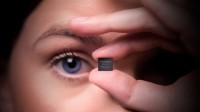Intel, Tencent Partner on New AI Products to Advance Retail
November 5, 2018
Intel and China’s Tencent have partnered to create two AI-powered products. Announced at Tencent’s Global Partner conference, the two companies revealed DeepGaze, which uses artificial intelligence to track customers in brick-and-mortar stores, and YouBox, also designed for use in retail settings, an on-premises server that uses AI to input real-time feeds from up to 16 cameras. Both products were developed in Tencent’s YouTu Lab for computer vision research, and sport Intel’s Movidius Myriad chips.
VentureBeat reports that DeepGaze can “track the number of customers near a given shelf display at various times throughout the day, and perform hybrid object detection — some on-device, and the rest in Tencent’s Intel Xeon Scalable processor-based cloud.” Intel’s Movidius Myriad 2 vision processing unit (VPU), also found in Google’s Clip camera, Flir’s Firefly, and DJI’s Phantom 4 drone, is “optimized for image signal processing and inference.”

“Tencent’s new … [solution] take[s] advantage of powerful Intel … chips to enable deep neural networks to run directly on the cameras, providing real-time and actionable data for various businesses, including retail and smart buildings,” said Intel AI Products Group vice president/chief operating office Remi El-Ouazzane.
Together with YouBox, DeepGaze can help retail stores “predict sales performance and product turnover … enabling them to restock shelves without the need for manual inventory management.” Tencent YouTu Lab general manager Simon Wu called Intel “the perfect partner for our flexible enterprise solutions,” adding that the Movidius chips and VPUs, camera and YouTu box “perform inference at the edge in tandem with Intel Xeon Scalable processors in the cloud to provide cost-effective and flexible solutions for verticals including retail and construction.”
Using AI solutions for retail analytics is not new. In June, NTT East and startup Earth Eyes unveiled AI Guardsman, which uses machine learning to “prevent shoplifting by scanning live camera feeds for suspicious activity,” and Standard Cognition, Trigo and Zippon use AI for cashierless stores that produce troves of customer data. Amazon is the giant in the space with its four Amazon Go stores; according to Bloomberg, the company plans to open as many as 3,000 locations by 2021.
Tencent is intent on gaining market share with AI, having “poured more capital into startups and AI chips than its biggest Chinese rivals, Baidu and Alibaba.” Among its big investments is in “robotics startup UBTech, which aims to develop a humanoid robot capable of walking downstairs and autonomously navigating unfamiliar environments.”
Tencent, whose main lab is in Shenzhen, opened a U.S.-based lab in 2017, in Bellevue, Washington, headed by Dr. Dong Yu, “a former Microsoft engineer and pioneer in speech recognition tech.” Intel has equal ambitions to gain prominent footing in AI, and “partnerships with OEMs like Tencent are a step” towards that.

No Comments Yet
You can be the first to comment!
Sorry, comments for this entry are closed at this time.